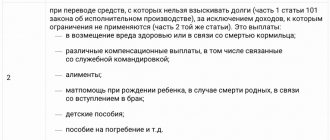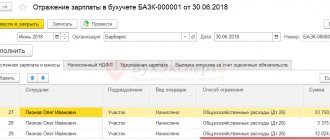Payment online
On the website of the Federal Bailiff Service (FSSP) there is a database of enforcement proceedings, with which you can find out about the existence of a debt and pay it immediately.
To do this, just indicate your region, full name and date of birth. If there is a debt, the system will find and provide all the necessary data and offer to pay. In the “Service” column, the debtor can choose one of six payment options:
- through the payment system “Oplatagosuslug.ru” (payment by bank card or from a mobile phone account);
- through the service for paying debts under enforcement proceedings of the Leader payment system and Promsvyazbank (payment by bank card);
- through the Robokassa service (payment by credit card, there is a limit on the maximum payment amount - 15 thousand rubles per day);
- via Qiwi Wallet (amount limit – 15 thousand rubles);
- via WebMoney;
- through Yandex.Money (payment system, including allowing you to pay debts through mobile phone stores, amount limit is 15 thousand rubles).
For transfers to bailiffs you will have to pay a commission of 2.3-2.5%, everyone except Qiwi - the system will do it for free.
For Sberbank cardholders, there is another method of online payment without commission - through a personal account on the bank’s website. They just need to select in the “Transfers and Payments/Payments for Purchases and .
Methods without commission
Attitudes towards deducting a commission for payment can be different:
- For some, the size of the commission is not important. For example, the debtor wants to pay a small fine to the traffic police if it has already been handed over to the bailiffs. The amount of the commission in this case will be a couple of tens of rubles, and the payer will most likely choose the most convenient and fastest payment method.
- Someone is looking for the opportunity to pay off a debt to the FSSP without a commission. If a large debt needs to be paid, and the debtor is already in a difficult financial situation, he will probably try to avoid additional expenses.
At the moment, debtors have only three interest-free ways to transfer money to the FSSP deposit account.
ELPLAT
The electronic wallet “ELPLAT” was created specifically for paying any budget payments via the Internet: taxes, court debts, contributions to the Pension Fund. This service allows you to pay your debt to the FSSP without commission. However, replenishing this wallet for an individual is always paid: from 1.5% to 5%, depending on the type of account verification.
Personal account "Yandex.Money"
To pay a debt to bailiffs without commission on the Yandex.Money portal, you need to follow the algorithm:
- Go to the “Payment for services” tab.
- Select the “Taxes” section.
- In the “What we use” column, select “Receipt”.
Payment via terminal
In many territorial departments of bailiffs, terminals and ATMs for instant debt payment are installed. To use them, you need to know the number of the enforcement proceedings (you can check it in the database of enforcement proceedings).
By the way, you can also pay your debt in Qiwi terminals, following a simple algorithm.
Another possible location for terminals is airports. On the one hand, their presence there is logical - for the convenience of those who only learned before departure about the restriction of the right to travel abroad. But the process of data exchange between the bank, bailiffs and border service takes up to ten days. Therefore, paying on the spot is pointless - the person will not be able to fly anyway. True, the country's chief bailiff, Artur Parfenchikov, promises that in the near future the period for lifting this restrictive measure will be reduced to several hours (to a maximum of one day).
Be on time
From the moment of initiation of enforcement proceedings, the debtor has 5 days to voluntarily repay the debt. If payment is not made within this period, the bailiff proceeds with forced collection and charges an enforcement fee. In this case, the defendant will have to not only fully repay the debt to the creditor, but also pay an additional 7% to the state.
It is important to understand that only prompt payment of the writ of execution submitted to the FSSP will allow the debtor to avoid seizure of real estate, blocking of accounts, seizure of valuable property and other enforcement measures. In difficult life circumstances, when it is impossible to repay the entire amount of the debt at once, the defendant may petition the court for a deferment or installment plan.
Summarize:
- Payment of the debt within 5 days will exempt you from additional expenses for reimbursement of the enforcement fee.
- It is in the interests of the debtor to repay the debt as quickly as possible, without waiting for the enforcement actions of the bailiff for forced collection.
Personally in hands
You can pay the debt for enforcement proceedings in cash in the bailiff’s office. The main thing is to be sure to take a receipt indicating the payment amount. The certificate must be certified by the official seal of the bailiff department.
In its memo, the FSSP draws the attention of defaulters that in addition to the receipt, the bailiff is obliged to fill out the receipt stub in the presence of the debtor. The debtor must check the data in two pieces of paper - it is important that the amounts in them coincide.
When choosing any payment method, it is worth considering that the debt will not be repaid immediately, but within 3-7 days. First, the money goes to the deposit account of the bailiffs department, is distributed, and then transferred to the creditor.
What debts are transferred to bailiffs
If one person delays payment to another person, the recipient of the money has the right to go to court. In case of a positive decision of the court, if the debtor voluntarily does not pay the debt, it is transferred for forced collection
. In this way debts are collected for:
- loans;
- alimony;
- utility bills;
- receipts;
- before an individual entrepreneur or LLC;
- lease agreements.
The person to whom the debt is owed can go to court in other cases. To do this, it is enough to have an agreement
, which contains the signature of both parties and the terms of payment of money.
For example, a girl decided to sell a fur coat to a friend that was too big for her for 100,000 rubles. When handing over the goods, they executed a handwritten sales contract. It stated that payment under the contract should be made once a month to the seller’s bank account, according to the specified details. Since payment was not received for 5 months, the seller asked to return the fur coat.
Upon receiving a refusal, she went to court. In court, the fur coat was confiscated and a decision was made not to return the first payment.
.
How to fill out a payment form in the FSSP for taxes
The document is drawn up in accordance with the rules provided for transferring payments to the state budget (Order of the Ministry of Finance of the Russian Federation No. 107n dated November 12, 2013).
If the payment is made for an individual (employee), the following data must be indicated:
- date of document preparation;
- payment amount (in words and figures);
- TIN of the individual for whom the responsibility is being performed, or “0” if there is no TIN;
- in the “Checkpoint” field put “0”;
- short name of the organization making the payment (field “Payer”);
- in field 101 “Payer status” enter code “19” - deduction from salary (Appendix No. 5 to Order No. 107n of the Ministry of Finance of the Russian Federation);
- in the “Payer’s bank” field, indicate the name of the payer’s bank, BIC and current and correspondent account numbers;
- UIN code (field 22) – a unique accrual identifier (if it is known, the code is written in full; if not, “0” is entered in the field);
- in the “Payment order” field indicate “1”;
- in the “Type of operation” field put “01”;
- in field 105 it is necessary to enter the OKTMO code, determined by the location of the FSSP body performing debt collection.
In field 108 of the payment slip “Document number” indicate the code and details of the document that allows you to identify an individual. If such a document is a passport, put “01”, SNILS – “14”, etc. An example entry looks like this “01; 12 34 567890.” The field may not be filled in if the individual’s TIN is indicated on the payment.
In fields No. 106, 107 and 109 you should enter “0”. These fields must be present in the payment order, but it is not necessary to indicate detailed information in them.
Who should pay the traffic police fine if it is handed over to bailiffs?
If you found a traffic police fine in the FSSP database, it means you are overdue. But where should the payment be sent in this case? There are 2 options for who to pay the fine:
1STSI.
You can send payment of an overdue fine directly to the traffic police. However, in this case, you will have to independently notify the bailiff that you have repaid the debt. Otherwise, the debt will continue to be listed in the FSSP database, and the bailiff will begin to take measures against you - from assigning an enforcement fee to temporary deprivation of rights.
2Bailiffs.
This method is more convenient, since you do not have to notify the bailiff about the repayment of the debt. By repaying the debt through a bank, online or in person, you automatically notify the FSSP that you are no longer a debtor, and the funds are redirected to the collector (in this case, the State Traffic Inspectorate).
Notification of the debtor about the seizure of funds in the account
According to No. 229-FZ “On Enforcement Proceedings,” bailiffs are required to notify debtors that they have legal debt. They can do this either by sending written notices or via the Internet or telephone.
If a person does not like the current form of notification, he can ask the bailiffs to change it. To do this, you just need to write a short statement addressed to the bailiff.
Notification of the debtor may take the form of an appearance before a bailiff. If a person does not come to his appointed meeting, he is subject to forced arrest. On the spot, they will explain to him the reason for the debt, name the amount and list payment methods.
However, this does not apply to situations where the writ of execution orders the bailiffs to take immediate action against the debtor. Bailiffs are also not required to notify a person in advance that the service has seized funds by court order. But they still must notify the debtor about this within 24 hours after execution of the writ.
At the post office
To send money to pay off a debt through Russian Post, it is important to provide the communication center operator with the correct recipient details. You can find them:
- upon a personal visit to a bailiff;
- from the executive document;
- from a receipt from the FSSP website.
The postal worker will accept the money from the debtor and issue a receipt with a post office stamp.
What difficulties might you encounter?
It is not difficult to send a copy of the receipt indicating payment to the FSSP, the main thing is to have a document on hand that can confirm that the operation was carried out.
The debt can be repaid in a bank, terminal or via the Internet. In all these cases, you can get a receipt, but sometimes due to technical failures, perhaps because the device does not have paper for receipts or for some other reason there is no document that confirms the transaction, but you should not be upset. It is possible to find a solution.
Paying a fine is not a difficult task, but sometimes failures in the system or the World Wide Web provide unreliable data. In this case, you need to remember how the operation took place, at what time and what amount was sent; this may help in the future.
If the driver is completely sure that he really made the payment, then he needs to prove this, and not just in words, but provide confirmation to the FSSP service.
Consequences of non-payment
In the letter to initiate criminal proceedings, the bailiffs inform the debtor that certain measures may be taken.
Among them:
- seizure of movable and immovable property without the right to dispose of it;
- debiting funds from a bank account;
- restriction of entry into the territory of the Russian Federation;
- suspension of a driver's license (if the fine owed exceeds 10 thousand rubles).
IMPORTANT! Restrictive measures are lifted only after the debt is fully repaid. It is worth paying attention to the fact that it usually takes another 10-12 days after payment for the sanctions to be lifted.
Paying the debt to the bailiffs is a mandatory procedure. If for some reason it was not possible to pay the debt through terminals, the application, Sberbank Online, contact the FSSP. Employees will accept the money and in return will issue a receipt confirming that the debt has been repaid.
FAQ
What to do if the debt is not displayed on the FSSP website?
Either the database has not yet been updated, or the personal data was entered incorrectly. In the first case, you just need to wait a few days. In the second case, you need to check whether all the data was entered correctly.
Is it possible to pay court debts through mobile banking?
Debtors have this opportunity. In this case, you will not even need to enter the password from your personal account or the code from the SMS. The payment will reach the FSSP instantly.
How quickly will a payment from Sberbank reach the bailiffs?
The funds are debited from the client’s Sberbank account and instantly reach the FSSP. If your database search continues to return debt data, you just need to wait until it is updated.
We recommend reading:
- Payment for housing and communal services in Sbol: how to pay without commission;
- How to pay for gas through Sberbank online: detailed instructions;
- Payment by barcode and QR-code of accounts in Sberbank online.







